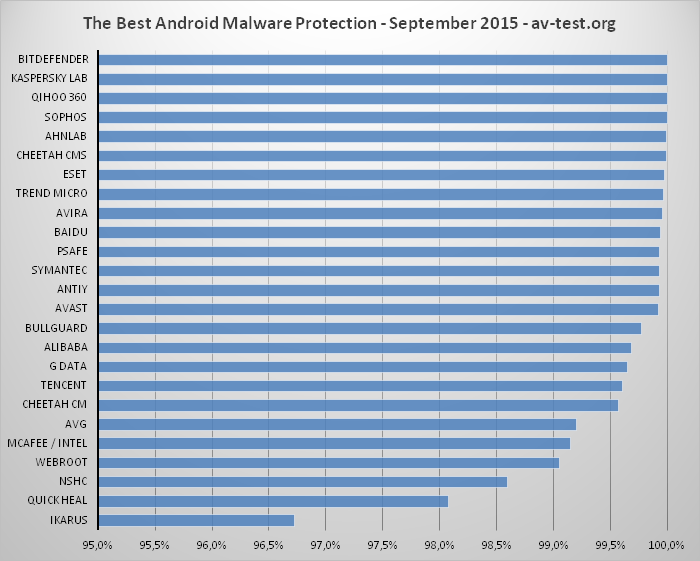Ikarus Security App Could Leave Your Android Vulnerable
Most of the popular Android security suites work very well, but a handful fall well below acceptable safety and usability parameters.


Android, as the world's most popular mobile operating system, gets more than its fair share of malware. AV-Test has ranked the most popular Android security programs. The company found that while most of them work perfectly -- 16 of the 25 programs tested -- a handful fall well below acceptable safety and usability parameters.
Ikarus Mobile Security 1.7, specifically, scored only four out of six points in protection and three out of six in usability. Needless to say, it's not making our list of the best Android antivirus apps.
For reference, the protection score means that the program detected 97.9 percent of known Android malware, and only 95.6 percent of new Android malware. These numbers may sound high, but the industry averages are 99.6 and 99.5 percent, respectively, meaning that an awful lot could slip through in those last few percentages.
The company evaluated the Android software on two counts: Protection and Usability. The former was a quantitative measurement of how well the program could detect both new and tried-and-true Android malware.
The latter was a more qualitative assessment of how user-friendly a program was: an important metric, considering that both the tech-savvy and tech-illiterate alike own Android smartphones.
Quick Heal Total Security 2.01 and NSHC Droid-X 3.0 likewise received substandard scores for protection, while AVG AntiVirus Free 4.4 failed to impress with its user interface.
For those Android owners running one of the top 16 apps: AhnLab V3 Mobile Security 3.0, Antiy AVL 2.3, Avast Mobile Security 4.0, Avira Free Android Security 4.2, Baidu Mobile Security 5.8, Bitdefender Mobile Security 2.46, BullGuard Mobile Security 14.0, Cheetah Mobile Clean Master 5.10, Cheetah Mobile CM Security 2.7, ESET Mobile Security & Antivirus 3.0, G Data Internet Security 25.9, Kaspersky Lab Internet Security 11.9, Norton Mobile Security 3.11, PSafe Total 2.5, Qihoo 360 AntiVirus 2.1, Sophos Mobile Security 5.0 and Trend Micro Mobile Security 7.0, you can rest easy. Those all scored six out of a possible six points in both protection and usability.
Sign up to get the BEST of Tom's Guide direct to your inbox.
Get instant access to breaking news, the hottest reviews, great deals and helpful tips.
Four other programs all scored decently well in both categories, but fell short of the category leaders: Alibaba Mobile Security 2.8, McAfee Mobile Security 4.5, Tencent Mobile Security Manager 5.7 and Webroot SecureAnywhere Mobile 3.7.
AV-Test, a Madeburg, Germany-based security firm, has made its name by evaluating protection programs for computers and mobile devices on a regular basis and ranking the results.
The last time it tested Android products was back in July, and September's rankings, while not drastically different, help illustrate which programs are consistently good and which consistently fall short.
(The lab also provides useful test results on the best antivirus software and the best Mac antivirus software.)
The bottom line is that the vast majority of the products tested will protect you from almost all known and new Android malware. Even the programs that did not score well still keep your system much safer than nothing at all.
Barring a security suite, the best way to keep an Android device safe is to disallow installation of apps from third-party sources (you can do this in the Settings menu) and be judicious about following suspicious links.
Marshall Honorof is a senior editor for Tom's Guide, overseeing the site's coverage of gaming hardware and software. He comes from a science writing background, having studied paleomammalogy, biological anthropology, and the history of science and technology. After hours, you can find him practicing taekwondo or doing deep dives on classic sci-fi.

